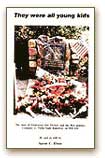Chapter 5
Rescued
Dawn broke quietly over no manís land on July 12th. Jim Rothschadl, the skin around his eyes so puffed from his burns that he could hardly see, remembers hearing birds singing. He didnít know how long or even if he had slept. But he was thirsty and he was feeling bad, as badly as he had ever felt. He walked over to a corner of the field, away from Flowers and the gravely injured infantryman, and he thought about ending his life.
Just then, he heard Jim Flowers calling to him, asking if he had a cigarette.
Fifty years later, the situation struck Rothschadl as ironic. He had cigarettes, but they were in his shirt pocket, and his hands were so swollen that he couldn't reach in to retrieve them. But the request was just enough to pull him back from a precipice he doesn't like remembering that he stood at.
With his tender fingers, Rothschadl pulled the skin down below one eye and found his way over to Flowers, and between them they managed to retrieve the cigarettes from Rothschadl's pocket. The scene might have been comical if they weren't both so badly hurt. Rothschadl recalls that Flowers asked him to go and look for help, because he was getting gangrene in his legs.
Rothschadl crawled through an opening in the hedgerow, and began groping his way along, every so often pulling down the skin below his eye so he could see.
Suddenly he heard laughter. Derisive laughter. He looked and saw a German machine gun crew. They had a water-cooled machine gun. He could tell by the large casing on the barrel. They were looking at him and laughing. Rothschadl thought, "Go ahead, shoot me!" He would have welcomed it. But nothing happened. So he turned around and began crawling and pulling himself along in the other direction. He passed the hole in the hedgerow and kept on going.
He doesnít know how far he went, but after a while he looked up and saw a face. It belonged to a GI. The infantrymanís head must have been down, because it was level with Rothschadlís. Together they crawled through a large puddle, and all Rothschadl could think about was how thirsty he was. In a few moments they joined some other infantrymen, who also were low to the ground.
Rothschadl asked for some water. One of the GIs held out a canteen, and another said, "Only give him a little." Too much water would have done more harm than good, and might have even killed him, but the words made Rothschadl mad. He sipped the water, and the GI pulled the canteen away. Then Rothschadl told them his lieutenant was behind the hedgerow and needed to be rescued.
- - -
"Sometime after noon of Ö 12 July," Flowers said in the account he wrote from a hospital bed in 1946, "the infantryman told me he was going to die. He said that our infantry would never attack through our field and find us. I knew that if he continued to feel that way he would surely die. I assured him that our men would find us, and soon. I used every argument I could think of to persuade him to want to live. For a while I was successful. Later he said that he was dying. I tried everything again. I begged him. I bullied him. I pleaded with him. But I failed. I was holding him in my arms, praying to God to not let him die, when he took his last breath. I was heartbroken to lose him and I, too, wondered if our men would ever find us."
Dr. William McConahey, in his book "Battalion Surgeon," describes treating Jim Flowers when he was brought to an aid station on the beach.
"When his tank had been knocked out by an 88 during the fighting for Hill 122," McConahey wrote, "one of his feet had been virtually torn off. He had pulled himself out of his disabled tank, and a passing aid man had stopped the bleeding and bandaged the wound. Then an enemy counterattack threw back the Americans, so for two days the wounded man lay out there in No Manís Land. During the seesaw fighting back and forth many shells fell near him, and one large piece of steel shattered his other foot. ... Later, when one of my litter squads found him and brought him in and I heard the story, I expected to see a moribund patient, but such was not the case. He was calm, cheerful and not in shock. In fact, he was in excellent general condition, although both feet hung in tatters and would have to be amputated."







